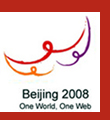Refereed Papers
| Browsers and User Interfaces |
Data Mining |
Industrial Practice and Experience |
| Internet Monetization |
Mobility |
Performance and Scalability |
Rich Media |
Search |
| Security and Privacy |
Semantic / Data Web |
Social Networks and Web 2.0 |
| Technology for Developing Regions |
Web Engineering |
WWW in China |
XML and Web Data |
Developers Track |
Panels |
Posters |
Tutorials |
Workshops
Social Networks and Web 2.0
Today a second generation of web-based communities and hosted services - such as social networking sites, wikis and folksonomies - is emerging which facilitate collaboration and sharing between users. The term Web 2.0 has been coined to embrace all those new collaborative applications and also to indicate a new "social" approach to generating and distributing Web content, characterized by open communication, decentralization of authority, and freedom to share and re-use. Implicit and explicit in many Web 2.0 applications are social networks, through which users share and filter content, collaborate, seek information, and interact socially on the Web.
The Web 2.0 and Social Network Track provides a unique forum both for describing innovative collaborative and open applications, and data sharing scenarios, as well as novel technologies and methodologies for building and managing these applications. We welcome contributions relating to specific classes of applications as well as to cross-cutting issues. Relevant topics include, but are not restricted to, the following:
-
E-Communities and Web-based collaboration
-
Ethnographic and data mining analysis of online communities including blogs, online social networking and social media sites, and tagging systems
-
Temporal and community evolution of Wikipedia and other open collaborative efforts
-
Social network analysis of online environments, including community discovery and structure
-
Social reputation and recommendation systems, trust management
-
Collaborative filtering and content ranking using social media
-
Data management in collaborative open applications
-
Assured data sharing and integration of access control policies
-
Data sharing incentives and risks
-
Metadata and annotation management
-
Intellectual property and DRM in Web 2.0 applications
-
Data and workflow provenance across Web 2.0 applications
-
Web standards for collaborative applications
-
Experience reports and case studies for collaborative open applications.
Paper formatting requirements will be provided on the submissions page.
-
Program Committee:
Anindya Ghose (Stern School of Business, New York University)
Anna Squicciarini
Aoying Zhou
Barry Smyth (University College Dublin)
Belle Tseng (NEC Labs America)
Cameron Marlow (Yahoo!)
Cliff Lampe (Michigan State University)
David Liben-Nowell (Carleton College)
Dennis Wilkinson (HP Labs)
Emil Lupu (Imperial College)
Eytan Adar (University of Washington)
Gueorgi Kossinets (Cornell University)
Han Woo Park (Yeungnam University)
John Riedl (University of Minnesota)
Kian-Lee Tan (National University of Singapore)
Kristina Lerman (USC)
Krithi Ramamritham (IIT Bombay)
Kwei-Jay Lin (UCI)
Lalana Kagal (MIT)
Marc Smith (Microsoft)
Massimo Mecella (SAPIENZA - Univ. Roma)
Matthew Hurst (Microsoft)
Matthias Jarke (RWTH Aachen University)
Rafae Bhatti (IBM Almaden)
Rahul Sami
Rohit Khare (CommerceNet)
Shel Finkelstein (SAP Labs)
Yutaka Matsuo (AIST)


.jpg)











